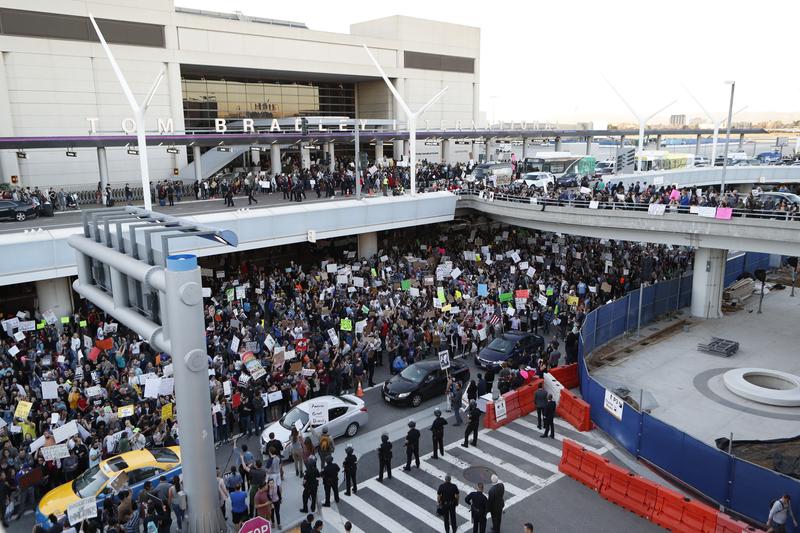BOB GARFIELD: From WNYC in New York, this is On the Media. I’m Bob Garfield.
BROOKE GLADSTONE: And I’m Brooke Gladstone. On Thursday evening, the 9th Circuit Court of Appeals upheld the stay on President Trump’s travel ban, as in “no travel ban.” In response, the president tweeted, in all caps, “SEE YOU IN COURT, THE SECURITY OF OUR NATION IS AT STAKE!” Now the case will likely go to the High Court. It’s the next chapter in a judicial page turner that opened last Friday when Federal Judge, or in Trump parlance, “so-called judge,” James Robart, blocked the administration’s Muslim ban and enraged the president.
[CLIPS]:
FEMALE CORRESPONDENT: He tweeted, “What is our country coming to when a judge can halt a Homeland Security travel ban and anyone, even with bad intentions, can come into the U.S.?”
MALE CORRESPONDENT: “Just cannot believe a judge would put our country in such peril. If something happens blame him and court system. People pouring in. Bad!”
[END CLIP]
BROOKE GLADSTONE: One could write all of this off as just another manifestation of his “tweet reflex” but members of the judiciary weren't having it, including Supreme Court nominee Neil Gorsuch, who shared his anxiety with Senator Richard Blumenthal.
[CLIPS]:
SEN. RICHARD BLUMENTHAL: He certainly expressed to me that he is disheartened by the demoralizing and abhorrent comments made by President Trump about the judiciary.
BROOKE GLADSTONE: It’s rare for a Supreme Court nominee to speak disparagingly of his nominator, yet, according to Blumenthal, desperate times call for desperate language.
SEN. RICHARD BLUMENTHAL: We are careening, literally, toward a constitutional crisis.
[END CLIP/CHORD, MUSIC OUT]
BROOKE GLADSTONE: Constitutional crisis? Blumenthal's alarm on Thursday capped the week of media debate over whether Trump’s disregard for governmental norms means we are in the midst of this - esoteric legal term.
[CLIPS]:
FEMALE CORRESPONDENT: There are some judges who are suggesting that that’s possible, that America might find a constitutional crisis. It’s not clear over exactly what.
MALE CORRESPONDENT: There are many senior Democrats who believe that Donald Trump is trying to precipitate a constitutional crisis through this aggressive assault on the judges.
[END CLIP]
BROOKE GLADSTONE: So are we in one or not? Will we know when it hits? What does “constitutional crisis” even mean? Legal scholars quibble over the niceties of a definition.
ADAM LIPTAK: Oh sure, you can define it backwards, forwards and sideways.
BROOKE GLADSTONE: That’s Adam Liptak, Supreme Court correspondent for The New York Times.
ADAM LIPTAK: I would say we are in a constitutional crisis if one of the branches goes way outside of its lane. It will come in the form, most likely, of a court giving the administration a definitive unambiguous instruction that the law requires it to do X and then the administration does not X, and then we’ve got problems.
BROOKE GLADSTONE: Like the potential episode we avoided last week, following reports that Customs and Border Patrol officers were continuing to detain people under the ban, in violation of the emergency stay issued by Brooklyn Judge Ann Donnelly.
[CLIP]:
MALE CORRESPONDENT: There was a fear on Saturday night in America that Judge Donnelly’s order would be defied by the president, that the president would then order the Executive Branch to overrule the Judicial Branch, something the president has absolutely no right to do. And, at that point, the Constitution would have broken.
[END CLIP]
BROOKE GLADSTONE: Yikes! Part of the term’s ambiguity stems from the lack of true historical precedent. The worst-case scenario hasn't been yet. For instance, in 1957, when Arkansas Governor Orval Faubus sent the Arkansas National Guard to bar the Little Rock Nine from entering a newly-desegregated high school, President Eisenhower ordered soldiers to escort the students in.
[CLIP]:
PRESIDENT EISENHOWER: … directing the use of troops under Federal authority to aid in the execution of Federal law at Little Rock, Arkansas. This became necessary when my Proclamation of yesterday was not observed, and the obstruction of justice still continues.
[END CLIP]
BROOKE GLADSTONE: Faubus’s troops ultimately stood down, constitutional crisis averted.
In 1832, there was another near crisis, when the Supreme Court under Justice John Marshall ruled that Georgia law could not be used to seize Cherokee land. President Andrew Jackson briefly threatened to ignore the ruling and taunted the courts with the famous, if apocryphal, words, “John Marshall has made his decision, now let him enforce it.” The courts didn't have an army then, and they don't today. With neither purse nor sword, the court relies on its mystique and the White House to enforce its rulings.
So when Trump questions the authority of federal judges and preemptively blames the court for future terror attacks, he sends real tremors through our delicate system of checks and balances. But it's not a constitutional crisis, yet. So, Adam Liptak suggests that we deploy the term with care.
ADAM LIPTAK: I think we’re much closer to one than anybody a couple of years ago would have envisioned. I don't think we’re terribly close, but we've moved in that direction rather faster than anyone should feel comfortable with.
BROOKE GLADSTONE: And what happens when you have a constitutional crisis?
ADAM LIPTAK: [LAUGHS] No, noth – nothing good. You know, I mean, lots and lots of demo - democracies revise, throw out, start over, and that is within the realm of possibility, I suppose.
[MUSIC UP & UNDER]
BROOKE GLADSTONE: Cheerful words from Adam Liptak, who covers the High Court for The New York Times.
BOB GARFIELD: Coming up, another constitutional issue, free speech, and how to enforce it, block it or simply manage it on the streets of our cities.
BROOKE GLADSTONE: This is On the Media.


